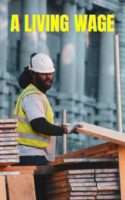Workers’ Day is an important time to think about all the struggles and victories of the labour movement and make sure that we’re fighting for workers’ rights. This is especially important in South Africa right now, where lots of young people are struggling to find work and make ends meet.
Throughout history, young people have played a big part in labour movements around the world, fighting for things like fair wages and safe working conditions. In South Africa, young people have been leading the charge for justice and equality for a long time, like during the Soweto Uprising and the #FeesMustFall protests. “We need to remember that we’re not alone in our fight for workers’ rights. We have a history of young people fighting for what’s right, and it’s up to us to keep that going,” says Mpho Motsoeneng, who’s 24 and can’t find work even though she graduated from university.
In South Africa, there’s so much inequality, and most people still live in poverty. We’re also known as one of the most unequal countries in the world, with a huge gap between rich and poor. For example, it was reported that the CEO of Capitec Bank makes R26 million a year, while the average bank teller makes only about R9000 a month. This is why it’s so important to talk about wages, especially the difference between the minimum wage and the living wage.
The minimum wage is the lowest amount of money that an employer is allowed to pay their workers. But sometimes, the minimum wage isn’t enough to pay for basic things like rent, food, and healthcare. This is especially true if someone lives in a city where things are expensive. On the other hand, the living wage is designed to be enough money to cover those basic things, no matter where someone lives. So, the minimum wage might not be enough, but the living wage should be.
“I’m lucky to have a job, but it’s sad that I can’t even make enough to cover all my expenses. I did everything I was supposed to – finished school and got an education – but it’s still not enough. Even now, I can barely get by. It’s really depressing,” says Zainab Salie, who’s 28 and works at a call centre.
When we look at how much some CEOs make, it’s hard not to wonder why the minimum wage isn’t higher especially in this country. According to some studies, a single person in South Africa needs at least R6,124 per month to live decently, and a family of four needs at least R15,178. These are just estimates, but when we think about how much things cost, like electricity, food, rent, transportation, data, airtime, and other household items, we can see that the minimum wage isn’t enough to cover everything. Maybe we need to use the energy we had during the #FeesMustFall protests to demand a living wage for all workers so that everyone can support themselves and their families with dignity.
***
If you enjoyed this you might like May Day! May Day! here
Tell us: “What are your thoughts on the current minimum wage in South Africa? Do you feel that it’s enough to cover the basic expenses that people need to live? Why or why not?”





